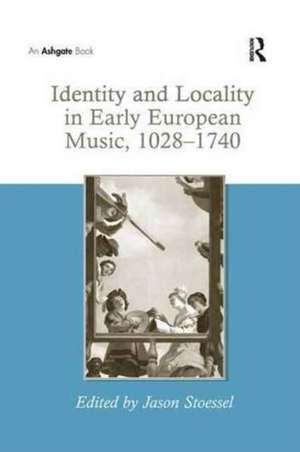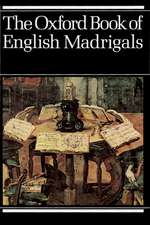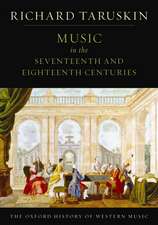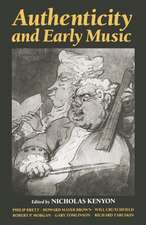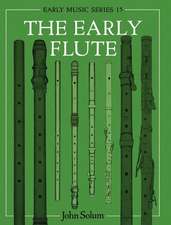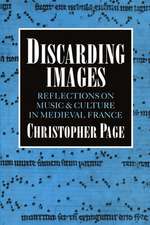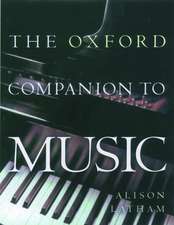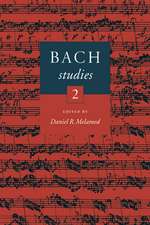Identity and Locality in Early European Music, 1028–1740
Editat de Jason Stoesselen Limba Engleză Paperback – 15 noi 2016
| Toate formatele și edițiile | Preț | Express |
|---|---|---|
| Paperback (1) | 489.26 lei 6-8 săpt. | |
| Taylor & Francis – 15 noi 2016 | 489.26 lei 6-8 săpt. | |
| Hardback (1) | 1054.71 lei 6-8 săpt. | |
| Taylor & Francis – 28 noi 2009 | 1054.71 lei 6-8 săpt. |
Preț: 489.26 lei
Nou
Puncte Express: 734
Preț estimativ în valută:
93.62€ • 97.75$ • 77.48£
93.62€ • 97.75$ • 77.48£
Carte tipărită la comandă
Livrare economică 04-18 aprilie
Preluare comenzi: 021 569.72.76
Specificații
ISBN-13: 9781138265783
ISBN-10: 1138265780
Pagini: 272
Dimensiuni: 156 x 234 x 15 mm
Greutate: 0.45 kg
Ediția:1
Editura: Taylor & Francis
Colecția Routledge
Locul publicării:Oxford, United Kingdom
ISBN-10: 1138265780
Pagini: 272
Dimensiuni: 156 x 234 x 15 mm
Greutate: 0.45 kg
Ediția:1
Editura: Taylor & Francis
Colecția Routledge
Locul publicării:Oxford, United Kingdom
Cuprins
Contents: Preface; Introduction; Part I Identity and Practice in Aquitanian and Iberian Plainchant: Adémar de Chabannes at the nexus of tradition and innovation, James Grier; Seeking early practice for the exultet in Iberia, Kathleen E. Nelson; Regional and royal: aspects of practice in 3 Portuguese prints of the Lamentations of Jeremiah (1543-1595), Jane Morlet Hardie; Plainsong in Eastern Spain and the tono valenciano, Greta J. Olson. Part II Late Medieval Aesthetics, Traditions and Practices: Some early references to Aristotle's Politics in Parisian writings about music, Catherine Jeffreys; Music and moral philosophy in early 15th-century Padua, Jason Stoessel; Late-medieval sacred songs: tradition, memory and history, Reinhard Strohm. Part III Local Practices in Renaissance and Baroque Music: Pervasive imitation in Senfl's Ave Maria...Virgo Serens: borrowing from Josquin in 16th-century Augsburg, Miranda Stanyon; Alessandro Scarlatti and the Roman copies of his Neapolitan compositions: a source study of the serenata Venere, Adone et Amore (1696), Rosalind Halton; 'After 6 weeks': music for the churching ceremonies of Maria Josepha, Electoral Princess of Saxony and Queen of Poland, Janice B. Stockigt; Bibliography; Index.
Notă biografică
Dr Jason Stoessel currently lectures on music history, musical cultures and music theory at the University of New England, Armidale, Australia. He has published on several topics in late medieval music, including notational process in early fifteenth-century manuscripts, intertextual process in the music of Johannes Ciconia, and editing late medieval songs. His current research is directed to investigating musical culture in late medieval Padua.
Recenzii
'This collection documents the 2006 National Conference of the Musicological Society of Australia. The topics and historical periods are widely distributed, though they keep to the conference's theme.' Sixteenth Century Journal
Descriere
This collection presents numerous discoveries and fresh insights into music and musical practices that shaped distinctly localized individual and collective identities in pre-modern and early modern Europe. Contributions by leading and emerging European music experts fall into three areas: plainchant traditions in Aquitania and the Iberian peninsula during the first 700 years of the second millennium; late medieval musical aesthetics, traditions and practices in Paris, Padua, Prague and more generally England, Germany and Spain; and local traditions in Renaissance Augsburg and Baroque Naples and Dresden. In addition to in-depth readings of anonymous musical traditions, contributors provide new details concerning the lives and music of well-known composers. This book will appeal to a broad range of readers, including chant scholars, medievalists, music historians, and anyone interested in music's place in pre modern and early modern European culture.
